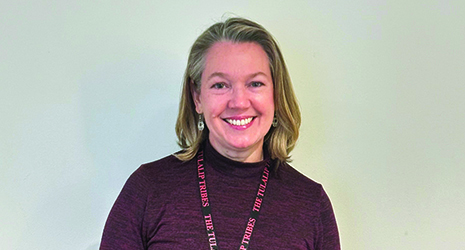
By Wade Sheldon, Tulalip News
On December 18, Dr. Karen Foster-Schubert, a seasoned medical professional with a rich background, has assumed the crucial role of the new medical director for the Tulalip Health Clinic. With roots in Seattle and a long career with the University of Washington Veterans Affairs (V.A.), Dr. Foster-Schubert brings a wealth of experience to shape the future of healthcare delivery for the Tulalip community. Emphasizing the collaborative approach needed for success, she notes, “There is so much to learn and many decisions to make going forward.”
Karen achieved her medical degree from Johns Hopkins University School of Medicine in Baltimore, Maryland, and did her internal residency in San Francisco. Then, she returned to the Pacific Northwest to finish her fellowship at the University of Washington before becoming a faculty member at the VA.
While immersed in roles at the V.A., Dr. Foster-Schubert found herself at the nexus of administrative leadership with an unwavering commitment to improving healthcare systems. Little did she anticipate that her extensive background, including spearheading the endocrinology department and serving as the Vice Chief of Medicine, would draw the attention of Jeremy Howell, the Health System Administrator for Tulalip.
“I knew Jeremy from the V.A. and several specialty care work,” Karen said. “So when he reached out, I was like, this seems like a good opportunity to work with some amazing people, make a difference in how the healthcare system is organized, and bring in some specialty care. I am an endocrinologist, so I do a lot of work with diabetes and metabolic disease.”
Dr. Foster-Schubert’s decision to embark on this new chapter stemmed from a desire to make a tangible impact. Moving away from the expansive yet bureaucratic V.A. environment, she sought a more hands-on role where her insights could directly influence positive change. The pressing goal for Tulalip became clear – accreditation, which is a review process to determine if programs meet official regulatory requirements and standards of quality

“One of our biggest goals is accreditation,” Karen explained. “The accreditation process helps ensure a safety and healthcare excellence culture and improves access and equity. We have a consulting team to help look at every aspect that needs to be addressed to become accredited.”
Karen continued, “Another goal would be to focus on a culture of respect. That means that we all need to respect one another, respect everyone’s rules, and have a good understanding of everyone’s rules. This is not only for our staff and providers but also for our patients so that we are treating our patients with respect and, in return, creating a better sense of trust.”
As the tribe endeavors toward accreditation, Dr. Foster-Schubert lays out the multifaceted approach necessary for success. Addressing fundamental aspects such as the healthcare environment, safety protocols, and infection prevention systems, the tribe aims to overhaul its primary care system.
While acknowledging the enormity of the accreditation process, Dr. Foster-Schubert views it as an opportunity for constructive change. She envisions a roadmap that aligns with Tulalip’s goals, emphasizing that accreditation isn’t a sign of past shortcomings but a collective journey toward more efficient and effective healthcare delivery. The tribe’s investment in training, particularly launching the patient-centered medical home (PCMH) process, underscores the commitment to coordinated care and continuous improvement.
“This is a little bit of a learning process for me,” Karen said. “I’m trying to understand how this system focuses on primary care delivery. I’m particularly concerned with ensuring efficient communication within our system and with external referrals. Since we can’t offer every specialty care in-house, it’s crucial to streamline the process for a seamless experience. We want to make it so that when we can’t provide the care in-house, and when they travel outside our health system to get the care they need, they know they have our support and understanding of navigating the health care system.”
Dr. Foster-Schubert concluded with a focus on change management and the importance of transparency and engaging tribal members in the process. “Change can be scary, and I want to do that in a way where everyone is engaged and excited. Be willing to be transparent; our tribal members must hear people’s voices around what perceived gaps we have and what needs aren’t being met.”